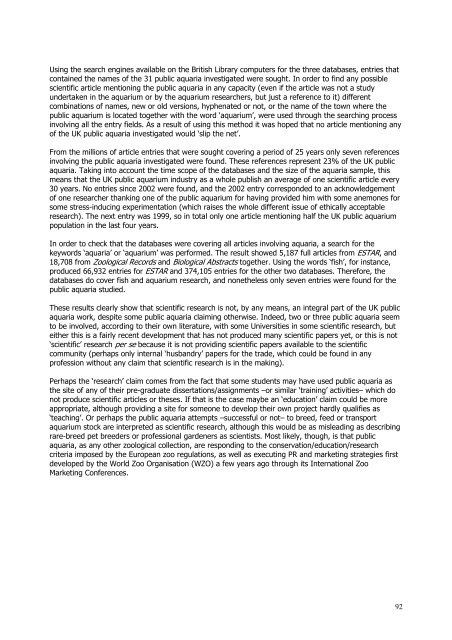Aquatic Zoos - Captive Animals Protection Society
Aquatic Zoos - Captive Animals Protection Society
Aquatic Zoos - Captive Animals Protection Society
You also want an ePaper? Increase the reach of your titles
YUMPU automatically turns print PDFs into web optimized ePapers that Google loves.
Using the search engines available on the British Library computers for the three databases, entries that<br />
contained the names of the 31 public aquaria investigated were sought. In order to find any possible<br />
scientific article mentioning the public aquaria in any capacity (even if the article was not a study<br />
undertaken in the aquarium or by the aquarium researchers, but just a reference to it) different<br />
combinations of names, new or old versions, hyphenated or not, or the name of the town where the<br />
public aquarium is located together with the word ‘aquarium’, were used through the searching process<br />
involving all the entry fields. As a result of using this method it was hoped that no article mentioning any<br />
of the UK public aquaria investigated would ‘slip the net’.<br />
From the millions of article entries that were sought covering a period of 25 years only seven references<br />
involving the public aquaria investigated were found. These references represent 23% of the UK public<br />
aquaria. Taking into account the time scope of the databases and the size of the aquaria sample, this<br />
means that the UK public aquarium industry as a whole publish an average of one scientific article every<br />
30 years. No entries since 2002 were found, and the 2002 entry corresponded to an acknowledgement<br />
of one researcher thanking one of the public aquarium for having provided him with some anemones for<br />
some stress-inducing experimentation (which raises the whole different issue of ethically acceptable<br />
research). The next entry was 1999, so in total only one article mentioning half the UK public aquarium<br />
population in the last four years.<br />
In order to check that the databases were covering all articles involving aquaria, a search for the<br />
keywords ‘aquaria’ or ‘aquarium’ was performed. The result showed 5,187 full articles from ESTAR, and<br />
18,708 from Zoological Records and Biological Abstracts together. Using the words ‘fish’, for instance,<br />
produced 66,932 entries for ESTAR and 374,105 entries for the other two databases. Therefore, the<br />
databases do cover fish and aquarium research, and nonetheless only seven entries were found for the<br />
public aquaria studied.<br />
These results clearly show that scientific research is not, by any means, an integral part of the UK public<br />
aquaria work, despite some public aquaria claiming otherwise. Indeed, two or three public aquaria seem<br />
to be involved, according to their own literature, with some Universities in some scientific research, but<br />
either this is a fairly recent development that has not produced many scientific papers yet, or this is not<br />
‘scientific’ research per se because it is not providing scientific papers available to the scientific<br />
community (perhaps only internal ‘husbandry’ papers for the trade, which could be found in any<br />
profession without any claim that scientific research is in the making).<br />
Perhaps the ‘research’ claim comes from the fact that some students may have used public aquaria as<br />
the site of any of their pre-graduate dissertations/assignments –or similar ‘training’ activities– which do<br />
not produce scientific articles or theses. If that is the case maybe an ‘education’ claim could be more<br />
appropriate, although providing a site for someone to develop their own project hardly qualifies as<br />
‘teaching’. Or perhaps the public aquaria attempts –successful or not– to breed, feed or transport<br />
aquarium stock are interpreted as scientific research, although this would be as misleading as describing<br />
rare-breed pet breeders or professional gardeners as scientists. Most likely, though, is that public<br />
aquaria, as any other zoological collection, are responding to the conservation/education/research<br />
criteria imposed by the European zoo regulations, as well as executing PR and marketing strategies first<br />
developed by the World Zoo Organisation (WZO) a few years ago through its International Zoo<br />
Marketing Conferences.<br />
92



